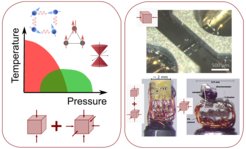Uniaxial and hydrostatic pressure tuning of quantum materials
The research of our group focuses on tuning quantum materials by external pressure. Despite being technically highly challenging, pressure tunes quantum materials in a particularly clean manner. It is also a versatile technique: pressure can be applied, e.g., uniaxially so as to control symmetries of the crystal lattice on which the electrons in quantum materials reside, or hydrostatically so as to control the volume. Thus, pressure cannot only be used for tuning quantum materials, but also for probing underlying symmetries and for investigations of the coupling of electronic to lattice degrees of freedom. By using and even combining different types of pressure, we seek to discover novel physical phenomena in quantum materials as well as to improve the understanding of existing ones. A strong focus of our group is on superconductivity and magnetism, but we also continue to expand our activities to other phenomena and material classes, such as topological materials.
To uncover new physics, it is not only important to develop novel techniques, but also to improve the resolution of existing ones. We are pursuing both approaches.
- Using piezo-based devices that were developed at the Institute and commercialized later on and through careful sample preparation, we can apply large, homogeneous and in situ-tunable uniaxial pressure. With these improvements, it is now possible to measure fundamental quantities at low temperatures with high precision. This includes, e.g., the elastocaloric effect, which is the change of temperature with lattice strain. We are currently working on implementation and improvement of a range of thermal techniques, such as elastocaloric and thermal conductivity measurements, and their application to a range of correlated electron systems.
- We also have demonstrated very recently that piezoelectric actuators can be used to apply uniaxial pressure inside a hydrostatic pressure cell. The combination of uniaxial and hydrostatic stress provides a very broad parameter space for tuning quantum materials. As a complementary tool, we also plan to study the anisotropic thermal expansion of solids under hydrostatic pressure.
For successfully performing the above-described activities, miniaturization and targeted design of the samples of interest, which can be done at the Institute with Focused Ion Beam techniques, will be the key.
Our recent work on uniaxial pressure tuning can be found here. Older publications of Elena Gati before joining the MPI CPfS can be found here.

